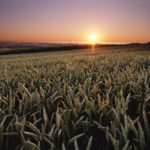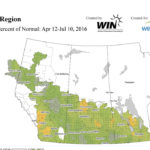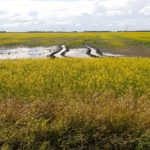Reading Time: 2 minutes Widespread showers and thunderstorms have continued to dominate weather patterns over the past several weeks. However, most areas across the province have also had some sunny and warm days to help mature crops. Provincially, crop growing conditions did not change from a week ago and are rated as 84 per cent good to excellent, compared […] Read more
Inclement weather helps put harvest operations behind average
Alberta crop conditions as of August 16

Crop conditions improve, harvest operations underway
Alberta crop conditions as of August 9
Reading Time: 2 minutes Rains continued to fall across the province stretching from the Peace Region to the Southern Region. Provincially, crop conditions improved for all Regions from a week ago and are rated as 84 per cent in good or excellent condition, up one per cent from a week ago and up 13 per cent from the 5-year […] Read more
Hail, flooding damage some crops, but most ‘good to excellent’
Alberta crop conditions as of August 2
Reading Time: < 1 minute Over the past week, rainfall activity has been convective in nature, with heavy downpours leading to localized flooding, and in some cases damaging hail across the province. This has maintained soil moisture levels, but slowed haying progress and reduced hay quality. In cases where crops are not performing well, it is largely due to excessive […] Read more
Haying dogged by persistent showers, crop conditions also affected
Alberta crop conditions as of July 26
Reading Time: < 1 minute Warmer temperatures covered the province but the persistent showery weather continued in most regions affecting haying progress principally but also crop conditions. The provincial crop condition rating was virtually unchanged from last week at 82.5 per cent of crops rated in good or excellent condition compared to the five year average of 72 per cent […] Read more

Our heads are in the clouds
Having trouble sorting out cumulonimbus, stratocumulus, and nimbostratus? Here’s your cloud-spotting guide
Reading Time: 3 minutes I’m currently off exploring the mountains of southeastern B.C. and southwestern Alberta and due to my travels, will have go with a more generic weather article this issue. I decided to take a look at something that ties into pretty much all of our weather — clouds. If we were to define a cloud, we […] Read more

No drying trend in store for Canadian Prairies
Commodity News Service – Crops on the Western Canadian Prairies could be seeing more soggy conditions in the next six to 10 days, according to a noted U.S. weather watcher. “Saskatchewan and Manitoba will probably have a net drying bias for this week,” said Drew Lerner of World Weather Inc. in Kansas City on July 25. […] Read more

Salvaging hail-damaged crops
Storm damage to crops can result in problems with nitrate accumulations, especially if the crops were heavily fertilized or manured in the spring to optimize yield. “With volatile weather comes storm damage and, for some producers, this means salvaging crops for feed,” says Andrea Hanson, beef extension specialist, Alberta Agriculture and Forestry, Airdrie. Hanson cautions […] Read more
Crops conditions mostly good, precipitation ranging excessive to dry
Alberta crop conditions as of June 28
Reading Time: 2 minutes June saw highly variable amounts of precipitation fall in the province from near excessive amounts of 150-250 per cent of normal in the Peace region, to above average quantities of 100-200 per cent in the North West, to below average of 50-100 per cent in the North East, and dry conditions to the Central and […] Read more

It’s that time of year when severe summer weather and tornadoes can form
Tornadoes have occurred in nearly all regions of Canada — here is what to look for when a severe storm is approaching
Reading Time: 3 minutes As we enter the peak season for severe weather across the Canadian Prairies, I figured now would be a good time to continue our look at severe weather and tornadoes. While Alberta doesn’t see the same number of tornadoes relative to areas to the east and south, the province is still subject to these events. Before […] Read more

Keep watch because pests got an early start
The mild winter and warm start to spring have given pests an ideal start
Reading Time: 3 minutes Here’s the bad news: The dry, hot start to spring means more insect pests this year. And even the bit of rain received during the May long weekend won’t make a difference. “Insects respond to the heat and it’s been hot — their life cycles are all moved forward and the crops are not thriving under […] Read more

